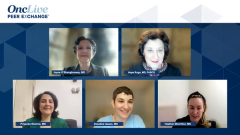
Navigating Treatment Challenges in HER2+ Breast Cancer
Experts analyze the complexities of HER2+ breast cancer treatment, exploring options in the third-line setting and the evolving landscape of antibody-drug conjugates.
Episodes in this series

This is a video synopsis/summary of a Peer Exchange involving Joyce O’Shaughnessy, MD; Priyanka Sharma, MD; Claudine Isaacs, MD; Heather McArthur, MD; and Hope S. Rugo, MD, FASCO.
The discussion focuses on third-line treatment decisions for patients with HER2-positive breast cancer post–T-DM1 and tucatinib exposure. Sharma anticipates evolving challenges with emerging data and considers factors such as CDK4/6 inhibitors. O’Shaughnessy and McArthur highlight the complexity of sequencing, emphasizing the lack of comprehensive data and exploring the intricacies of antibody-drug conjugates (ADCs). McArthur discusses the challenges and potential of novel ADCs, collaborations, and combinations with checkpoint blockade. The absence of clear sequencing guidelines underscores the importance of patient-centered shared decision-making, considering factors such as toxicity profiles and clinical characteristics.
Video synopsis is AI-generated and reviewed by OncLive® editorial staff.



































